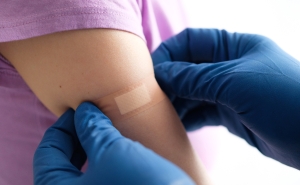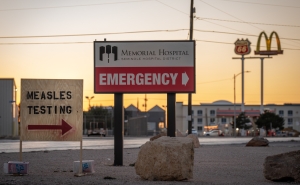The Long Road to COVID-19 Vaccines for Kids Under 5
Why has it taken so long to make COVID-19 vaccines available to young children?

Last November, after COVID-19 vaccinations were authorized for kids ages 5–11, many parents expected that kids under 5 would get their chance soon after. The process has taken more time than hoped—but it appears now that authorization of shots for the youngest kids may be on the horizon.
In this Q&A, adapted from the June 1 episode of Public Health On Call, Josh Sharfstein talks with vaccine expert Ruth Karron, MD, a professor in International Health and director of the Johns Hopkins Center for Immunization Research, about why it's taken so long to authorize vaccines for young children, why vaccinating this age group is important, and what's likely to happen in the next few weeks.
Why has it taken so long to make vaccines available for young children?
There are a couple of reasons. The first is that when we started to make COVID-19 vaccines in 2020, I don't think we appreciated the full burden of COVID on young children. Certainly we appreciated the indirect effects, on schooling and other social activities. But it took us a while to fully appreciate the direct medical effects.
The second piece is that we're using a new vaccine platform for COVID-19 vaccines: mRNA. It's highly effective, but it is also inflammatory. Anyone who's gotten these vaccines knows that you can have low-grade fever, chills, and aches of various kinds. And one of the things we know about children is that their inflammatory reactions are heightened. Children get fevers, for example, much more frequently than adults do.
The companies and the bodies that regulate these vaccines wanted to make sure that they were being evaluated as carefully as possible, to ensure that a vaccine would be safe to administer to children.
How did learning that children could develop multisystem inflammatory syndrome (MIS-C) after COVID affect your thinking about the importance of the vaccine?
This inflammatory response in children, MIS-C, is severe and quite frightening. We don't fully understand it, even now. It happens not during the acute infection but shortly thereafter. And it certainly made many people think that it might be important to develop a vaccine early on. Because this was understood to be an abnormal immune response to the virus, people wanted reassurance that vaccination wouldn't make it worse.
One of the important things we've learned as we've used vaccines in adolescents and children over age 5 is that it decreases the rate of MIS-C. It doesn't exacerbate it.
That's reassuring, but for me personally, the case for vaccinating children against COVID became clear in the late summer and early fall of 2021 with delta. By the time we got to omicron and child hospitalizations were surging, the case became very clear.
Public Health On Call
This article was adapted from the June 1 episode of Public Health On Call Podcast.
We often hear, ‘Children are just so much less likely to get sick, so why bother vaccinating them?’ Less than half of eligible younger kids have been vaccinated, so some parents are clearly wondering what the point is. Why do you think kids should be vaccinated against Covid?
This virus is smarter than we ever imagined. I remember saying in 2020 that this virus has got it made because it transmits really well. That was true of the early isolates of SARS-CoV-2. Omicron and its subvariants are more transmissible than measles—one of the most infectious diseases we know of.
What that means is that virtually everybody is going to get infected with this virus sooner or later. So, even if complications in children are rare, if everybody is getting infected, the absolute number of children who will have serious disease or who will die is not a small number. Right now, the CDC estimates that 1,200 children have died of COVID. We're talking for the most part about generally healthy children or children with minor medical issues. This is a tragedy. Whatever we can do to avoid this tragedy is something we should do.
For any one child, the risks may be low, but if you look across many children, you see some pretty severe outcomes.
Exactly. While I completely agree that the nonpharmaceutical interventions like masking are important, people do need to continue to lead their lives. Children need to be in school. Children need to be playing sports and congregating. This is part of childhood. Our children have lost years to this pandemic, in a much more profound way than adults have.
A lot of parents are interested in vaccinating their young kids, but vaccines haven’t been available for them.
Moderna and Pfizer have each applied to the FDA for an emergency use authorization, and the FDA is reviewing these applications and will hold public meetings with its advisory committee in June. We don't know the exact dates yet, but we’re hopeful that we will have one or both of these vaccines available for use in children sometime [in June].
That's an optimistic view. There have been some challenges with these trials to date.
There have been. Many people probably know about the Pfizer trial, which was originally for most normal, healthy adults and older children. Two doses of vaccine is what we consider a primary series of vaccination, and Pfizer was understandably very cautious in its dosing of vaccines for the youngest children. The dose for children under 6 months to 4 years of age was one-tenth of the dose given to adults—3 micrograms instead of 30 micrograms.
Early this year, Pfizer discovered that while it was safe, it did not produce the same immunity that they had seen in older children and adults. They've given a third dose of vaccine to this youngest age group, and that's what they've applied for FDA authorization for. The Moderna vaccine is given as a two-dose series.
Is the FDA going to wait to review both the Pfizer and Moderna vaccines at once, or each as it’s ready?
I think the agency has heard loud and clear from groups like the American Academy of Pediatrics and from parents that the time is now to consider these applications so that these youngest children can be protected. They are in the process of reviewing all of the data. There are challenges, of course, with vaccines for very young children. You absolutely want these vaccines to be as safe as possible.
The other complicated thing is that you're looking at efficacy data against a virus that's perpetually changing, so interpreting that data and the immune response is more challenging.
To me, it is understandable why it's taken so long. How little FDA has said to the public about it is less understandable.
I think it would have been helpful if the FDA had articulated what they were probably thinking: We want to have a plan to protect people from 6 months old through the rest of their lives. We've started with adults and some high-risk groups, and we are working our way down. We are committed to this. We are going slowly and carefully for the reasons we've articulated before. This is a brand-new kind of vaccine, and we need to be as careful as possible, but we understand the need and we are working with the manufacturers.
During this pandemic, the FDA has been very proactive in issuing guidance for EUAs and for licensure. I think they just were not communicating what was probably their intent all along.
Joshua Sharfstein, MD, is the vice dean for Public Health Practice and Community Engagement and a professor in Health Policy and Management at the Johns Hopkins Bloomberg School of Public Health. He is also the director of the Bloomberg American Health Initiative and a host of the Public Health On Call podcast.





